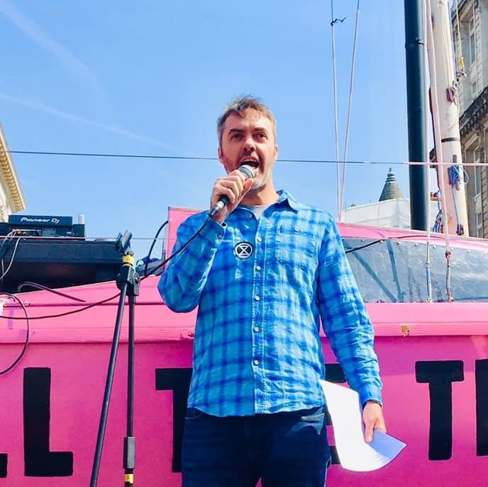Back in 2018, the sense of urgency about the climate crisis rose sharply, helped by several key voices, including Greta Thunberg, and Professor Jem Bendell. Jem uses the term Deep Adaptation as a focus for facing and adapting to the major climate and related challenges of the coming years, to emphasise that we need to find responses which go well beyond resilience in the way it is mostly understood. Whilst he strongly supports all efforts to reduce climate change, he cites extensive scientific evidence that it is too late to avoid serious worsening: this view has been well vindicated by developments since 2018.
As of 2023, the Deep Adaptation Forum is best summed up as an informal enabling network, with a range of online groups and resources (blogs, videos, special interest groups etc.) which have grown around Jem’s original paper published in 2018. It is worth clarifying that Deep Adaptation Forum is not a membership organisation, nor is it a lobbying or campaigning network. This blog offers my view of the main elements of DA. You can get a good overview and entry routes at www.deepadaptation.info. To see Jem’s updated version of his original 30-page paper, click here.
One of the many things I value in Jem’s approach is that he acknowledges the deep emotional and spiritual impacts of facing a bleak outlook, and points to ways to process these impacts, including faith, and “a vision of people sharing compassion, love and play.” Having led various groups on Deep Adaptation, I support the view that the first step in engaging with the climate crisis is to face and work through emotional responses, which may include fear, grief, bewilderment, and despair.
Jem believes that one of the best ways to process these feelings is the Work that Reconnects, initiated by Joanna Macy. Having space to voice your emotions in a supportive group, and have them witnessed, is an alchemical step that enables people to move forward whilst living with their feelings, and I’ve seen it work repeatedly. For my summary of Joanna’s process, click here.
 A distinctive part of Jem’s outlook is his belief that societal breakdown is likely in many countries including the UK within the next ten years. The most probable trigger for this is global food shortages. He shares the view of many experts that a Multi Bread Basket Failure is possible anytime from now: this means major crop failure in the same year for the few countries and staples most world population depend on.
A distinctive part of Jem’s outlook is his belief that societal breakdown is likely in many countries including the UK within the next ten years. The most probable trigger for this is global food shortages. He shares the view of many experts that a Multi Bread Basket Failure is possible anytime from now: this means major crop failure in the same year for the few countries and staples most world population depend on.
Jem’s expectation of societal collapse puts him at the pessimistic end of the climate experts I’m aware of. At the 2019 Findhorn climate change conference (see my blog here), I asked some of these other experts for their view, such as Jonathan Porritt, Vandana Shiva and Charles Eisenstein: they don’t think societal breakdown is likely. My view is that there will be major turmoil in many countries, and huge stress on western Europe and elsewhere from refugees, as well as food shortages. I believe that emergency resilience should now be a high priority for households, communities and government on all levels: see my blog on this topic here. I have commissioned research on how UK food growing can adapt, see research report here. On my Seeding our Future website, you will find a range of resources and insights on the theme of adaptive communities.
Overall, DA has two major, related strands:
- Inner adaptation: exploring the emotional, psychological, and spiritual implications of living in a time when societal disruption/collapse is likely, inevitable, or already happening.
- Outer adaptation: working on practical measures to support wellbeing, ahead of and during collapse (e.g. regenerative living, community-building, policy activism).
One of the most widely used DA frameworks is the 4R’s, summed up here using some quotes from Jem’s original paper:
- Resilience: recognising what we most want to keep, and skills to do so, including how to handle deep emotions such as fear and grief. Facing the emotional impacts enables us to act more clearly and coherently.
- Relinquishment: This “involves people and communities letting go of certain assets behaviours and beliefs where retaining them could make matters worse. Examples include withdrawing from coastlines… or giving up expectations for certain types of consumption”. We need to make voluntary choices where we can.
- Restoration: This “involves people and communities rediscovering attitudes and approaches to life and organisation that our hydrocarbon-fuelled civilisation eroded.” For example, the mutual support of local communities.
- Reconciliation: “With what and whom shall we make peace as we awaken to our mutual mortality?” This recognises that the pressures ahead may intensify polarities, extremism, scapegoating, and we need to get beyond them.
Deep Adaptation has attracted widespread support and involvement, and pushback, some of this from within the environmental movement. It highlights the dilemma between giving people the bad news and alarming outlook full force, or softening the message to avoid turnoff. Both sides in this argument cite experience and psychological research that supports their view. It’s not a debate that can be resolved, but it highlights a key factor: that emotional responses, not factual information, are what limit many people’s engagement with the issue.
If you start exploring Deep Adaptation online, you can soon feel overwhelmed. So here are a couple of suggestions on where to start.
- This 2020 blog by Jem gives an overview in a few paragraphs of how DA has evolved, plus a listing of his blogs, in categories, with links: click here.
- The Love in Deep Adaptation: a really well-considered piece about the huge focus in Western culture on individual needs and control, and how deep adaptation and rising uncontrollability offers the potential for a return to compassion, curiosity, respect, and love: click here.
- Beyond fed up: Jem in 2023 published an extensive, well-researched paper on the global food security threats: you can download it here.
Jem was always keen to avoid Deep Adaptation revolving around a founder, so in 2020 he stepped out of all formal involvement with the Forum. He continues to publish a lot of useful blogs and resources, and confusion can arise, because many people still think that he is speaking on behalf of the Deep Adaptation Forum, which is not the case. Jem’s current material is accessible via www.jembendell.com.
For a short, 14-minute video of Jem giving the essence of Deep Adaptation, click here; for a fuller, 44-minute version click here. If you want to go deeper into Deep Adaptation, and get actively involved, you can find out more at www.deepadaptation.info, where you can also join the Deep Adaptation Forums, including Food & Agriculture, Community Action, and more. You can also contribute to the discussion on Facebook: www.facebook.com/groups/deepadaptation.
In 2023, Jem published a book, Breaking Together: it’s frankly a heavy read, both because of its length and its extensive depiction of a doomster future (his word). It has some useful insights, but in my view fails in its central aim, to justify his belief that societal collapse is certain, soon. To see my blog about the book, click here. Jem and Rupert Read have also co-edited a book, published in 2021, titled Deep Adaptation: Navigating the Realities of Climate Chaos, with a range of impressive contributors, which provides a good overview of this complex and controversial field. Click here for my overview blog on the book.
